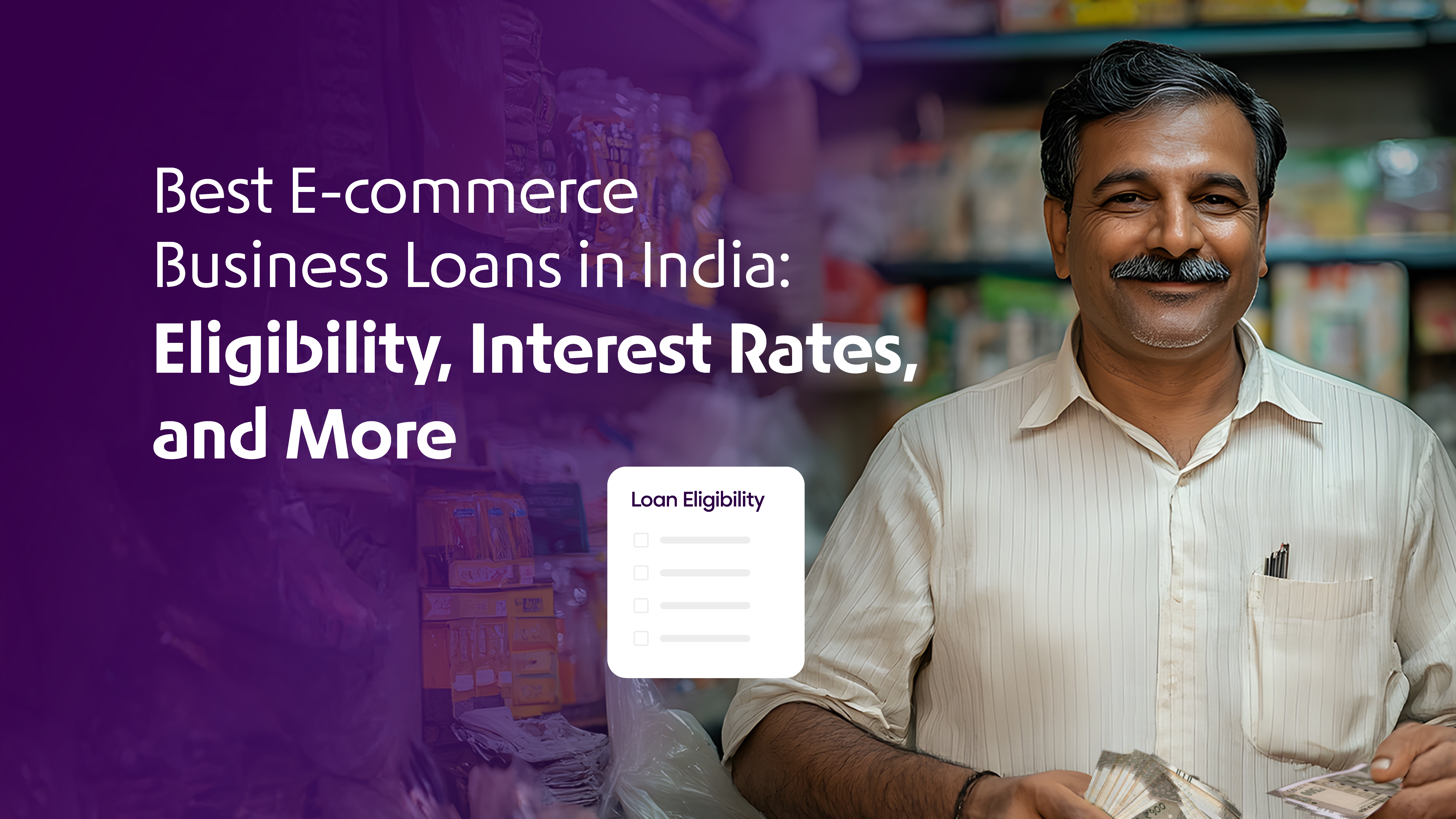In the past couple of years, the e-commerce market has grown immensely, with more people shifting or setting up their business online. To assist the growth of such businesses, multiple financial institutions and lenders in India provide a specialized loan known as an e-commerce loan.
E-commerce business loans are specifically curated to meet the needs and challenges faced by retailers, sellers, and entrepreneurs shifting towards online business or operating via E-commerce.
Why Do E-commerce Businesses Need Loans?
Owning an e-commerce business comes with certain financial challenges. From acquiring inventory to managing shipping and logistics. At certain times, businesses often face cash flow & working capital gaps. Here are some reasons why e-commerce businesses seek loans:
- Working Capital: To maintain a smooth pace of daily operations.
- Inventory Management: To be prepared for high demands.
- Marketing Campaigns: To increase the brand visibility and sales.
- Technology Upgrades: To enhance the user experience and website functionality.
- Expansion Plans: To level up the venture, enter new markets, or scale operations.
E-Commerce Loan Interest Rates in India
Interest rates are generally based on various factors like the lender, loan amount, creditworthiness, market conditions, and repayment amount. Usually, in India, e-commerce loan interest rates can start from 10% per annum.
Eligibility Criteria for E-commerce Loan in India
In India, specific eligibility criteria are based on revenue generation, business vintage, creditworthiness, and documentation. These criteria play a crucial role in securing an e-commerce loan.
Here are a few eligibility criteria for both businesses and borrowers:
Borrower’s eligibility criteria:
- The person should be a citizen of India and at least 21 years old.
- The person should have a good credit score (Likely to be above 700) and have a stable income.
- The person should not have any outstanding loans or discrepancies reported.
Business’s eligibility criteria:
- The business should have been operating for at least 6 months and should have been registered under the Companies Act 2013.
- The business should be generating a consistent and profitable income.
- The business should have a strong and viable business plan.
Documents required for e-commerce Loan
If you have the required paperwork in order, you can secure an e-commerce Loan without any hustle:
Personal documents:
- Identity proof: A valid government-issued photo ID like an Aadhar card, PAN card, or passport.
- Address proof: Bank statement, utility bills, or rent agreement with your address.
- Financial statement: Bank Statements and personal ITR.
- Credit score report: A good credit score can add substantial value to your loan application.
Business documents:
- Proof of business registration: Company registration certificates, GST registration certificates, or other relevant licenses, depending on your business’s nature.
- Financial statement: Past 2-3 years of bank statements, and income tax returns.
- Business plan & Sale and Revenue details: A clear business growth plan and proof of recent sale and revenue figures.
Types of E-commerce Loans
E-commerce loans are tailored to cater to the varied needs of online businesses. Here are the main types:
- Working Capital Loans:
These loans are ideal for managing daily operational costs such as payroll, rent, and utilities. They also assist in bridging cash flow gaps, ensuring smooth business operations.
- Term Loans:
It is offered for a fixed amount with a set repayment period, which best fits large-scale investments like purchasing equipment, upgrading technology, or expanding operations.
- Invoice Financing:
It helps businesses access funds based on outstanding invoices. It is ideal for e-commerce sellers with B2B client tails who have delayed payment terms.
- Merchant Cash Advances (MCA):
It provides a lump sum amount in exchange for a percentage of future sales. This is ideal for businesses with fluctuating sales cycles, as repayments are tied to revenue.
- Line of Credit:
A flexible credit option allows businesses to withdraw funds up to a predetermined limit as needed. Interest is charged only on the amount utilized, making it cost-effective for short-term needs.
- Equipment Financing:
It is precisely for purchasing or leasing equipment necessary for business operations. The equipment itself acts as collateral for the loan.
By choosing the right type of loan, your e-commerce businesses can address specific financial challenges effectively and maintain steady growth.
Best e-commerce Loan Providers in India
| Bank | Interest Rate |
| HDFC Bank | 11%* onwards |
| ICICI Bank | 12%* onwards |
| SBI | 10%* onwards |
| Kotak | 11%* onwards |
*Interest rates mentioned are subject to change.
Government Schemes Supporting E-commerce Businesses
In addition to private lenders, the Indian government also offers several schemes to support Micro, Small and Medium Enterprises (MSMEs), including e-commerce businesses:
MUDRA Loans: Under the Pradhan Mantri Mudra Yojana (PMMY), an individual can get up to INR 10 lakh. This scheme also provides loans to non-farm, non-corporate businesses. The loan is categorized into 3 different categories known as Sishu (up to ₹50,000), Kishor (₹50,001 to ₹5 Lakh), and Tarun (₹5,00,001 to ₹1 Lakh)
Credit Guarantee Fund Trust for Micro and Small Enterprises (CGTMSE): It’s a collateral-free loan for MSMEs. This scheme is eligible for both new and existing enterprises.
Your growth trajectory might be significantly impacted by obtaining an e-commerce loan that is customized to your needs. An E-commerce loan that meets your company’s requirements by considering your options and thoroughly weighing their limitations can be a game changer. However, to preserve a good credit score and cultivate enduring relationships with financial institutions, always make sure that payments are made on time.
Don’t let financial limitations hinder your e-commerce business growth. Utilize these lending options to grow your business and succeed in the competitive market.



